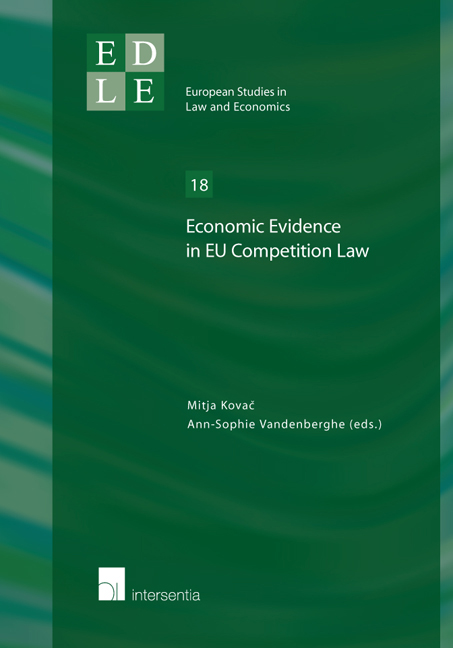Book contents
- Frontmatter
- Dedication
- Preface
- Contents
- List of Contributors
- General Introduction
- PART I ECONOMIC METHODS IN COMPETITION LAW
- PART II ECONOMIC EVIDENCES IN COMPETITION LAW
- PART III INSIDER TRADING, CARTELS AND CRIMINALISATION
- Chapter 8 An Analysis of the Criminalisation of Insider Trading at EU Level
- Chapter 9 The Criminalisation of EU Competition Law
- Chapter 10 Cartel Detection and Collusion Screening: an Empirical Analysis of the London Metal Exchange
- Chapter 11 Damages Claims in the Spanish Sugar Cartel
- PART IV PRELIMINARY RULINGS AND STATE AID CONTROL
- PART V ECONOMIC EVIDENCE, ENFORCEMENT PROBLEMS AND NATIONAL COURTS
- Index
Chapter 11 - Damages Claims in the Spanish Sugar Cartel
from PART III - INSIDER TRADING, CARTELS AND CRIMINALISATION
Published online by Cambridge University Press: 21 September 2018
- Frontmatter
- Dedication
- Preface
- Contents
- List of Contributors
- General Introduction
- PART I ECONOMIC METHODS IN COMPETITION LAW
- PART II ECONOMIC EVIDENCES IN COMPETITION LAW
- PART III INSIDER TRADING, CARTELS AND CRIMINALISATION
- Chapter 8 An Analysis of the Criminalisation of Insider Trading at EU Level
- Chapter 9 The Criminalisation of EU Competition Law
- Chapter 10 Cartel Detection and Collusion Screening: an Empirical Analysis of the London Metal Exchange
- Chapter 11 Damages Claims in the Spanish Sugar Cartel
- PART IV PRELIMINARY RULINGS AND STATE AID CONTROL
- PART V ECONOMIC EVIDENCE, ENFORCEMENT PROBLEMS AND NATIONAL COURTS
- Index
Summary
Whatever criticisms may be made of a system, which is designed to consolidate a partitioning of national markets by means of national quotas, the effects of which will be examined later, the fact remains that if it leaves in practice a residual field of competition, that field comes within the provisions of the rules of competition. § 24 Judgment of 16 December 1975, 40/73 to 48/73, 50/73, 54/73 to 56/73, 111/73, 113/73 and 114/73, Suiker Unie [1975] ECR 1663, 1915
The EU Sugar markets, under the CMO Sugar, are highly conducive to tacit collusion. The geographical separation of markets minimises the need for communication between the firms. A number of possible minor reforms could make the tacit collusion harder to sustain. Free trade would undoubtedly break any tacitly collusive behaviour and bring prices to the level of the world market, such a profound change is not realistic in the short run however. Swedish Competition Authority, Sweet Fifteen: The Competition on the EU Sugar Markets, Report 7/2002: 88.
INTRODUCTION
Until recently private damages claims arising from competition law (EU or domestic) violations have been rare in Spain. The few successful damage claims to date, referred predominantly to violations of Article 102 TFEU (or domestic equivalent). For that reason, the judgments recently delivered by the Spanish Supreme Court awarding € 5 million in damages on the two follow-on actions in the sugar cartel case is of major significance for future antitrust damages claims in Spain.
This chapter considers the relevant considerations made by the Spanish Supreme Court. In particular, it notes the Supreme Court approach as to the legal force given to public enforcement decisions, the calculation of damages, the Court's approach to the passing-on defence and the standing of indirect purchasers. To position the discussion in context, the article begins with a review of the functioning and singularities of the sugar industry and describes the Spanish Competition Tribunal decision uncovering and sanctioning the sugar cartel.
THE SUGAR INDUSTRIES
Certain features of sugar industries make them prone to anti-competitive practices. The raw materials used for sucrose production (sugarcane and sugar beet), are subjected to intense government regulation in many countries.
- Type
- Chapter
- Information
- Economic Evidence in EU Competition Law , pp. 213 - 236Publisher: IntersentiaPrint publication year: 2016

